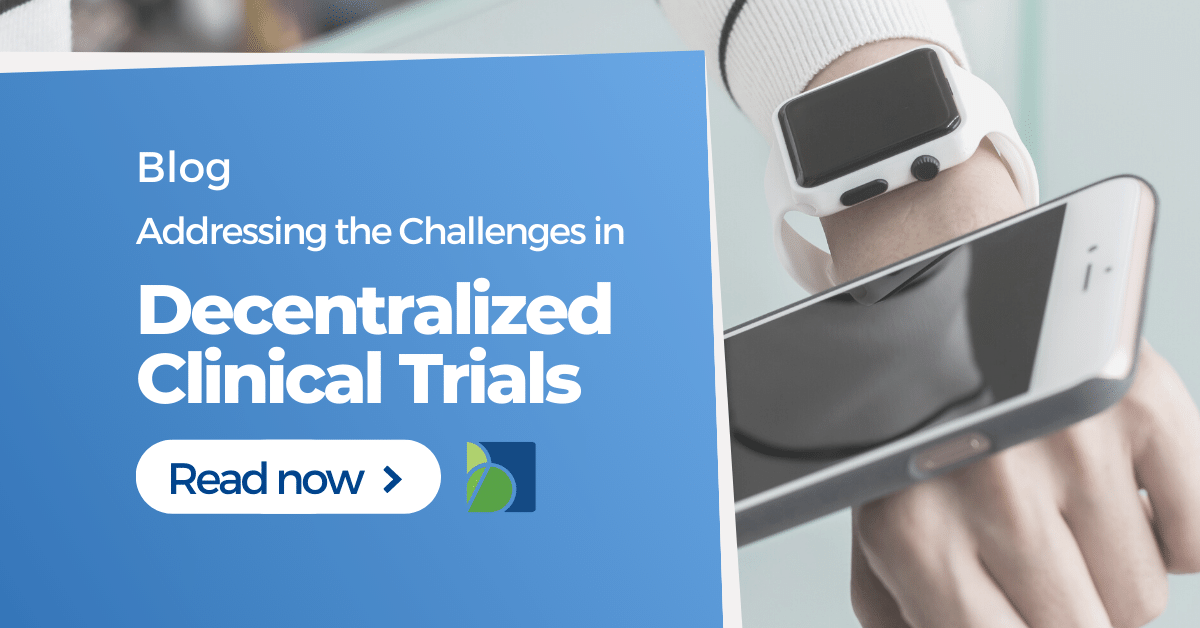The COVID-19 pandemic has accelerated the adoption of decentralized clinical trials by emphasizing the tangible advantages of virtual trials and their ability to improve the patient and physician experience. Moreover, it requires stakeholders to devote time and resources before reaping the benefits. Therefore, the pharmaceutical industry at large must learn how to effectively and flexibly implement Decentralized Clinical Trials and undertake a transformation together with patients and investigator sites alike. In this post, we’ll focus on the questions ‘What are the advantages of Decentralized Clinical Trials? and ‘What are the current challenges of implementing Decentralized Clinical Trials?’
Clinical-trial sponsors need to address of the challenges we can associate with most big changes; the reluctance to change itself. In this case, you can expect scepticism concerning the urgency of adopting Decentralized Clinical Trials, the involved price tag, and (for now) the utter lack of an established operating model. And, of course, you must be willing to invest in reshaping teams, engaging with new vendors, and starting learning again as an organization.
What are Decentralized or virtual trials?
Decentralized clinical trials can be defined as studies we execute through remote data collection and local investigators, making use of modern health technologies and virtual tools instead of relying on specialized research facilities.
Why are we moving to Decentralized Clinical Trials?
Clinical Trials Sponsors are always seeking to improve the efficiency and effectiveness of their clinical trials while also improving the patient and physician experience. Trial decentralization already emerged as a promising instrument in this effort years back. It implies delivering a growing part of a study’s operations to the patients home rather than meeting patients at a trial location. Besides COVID-19, evolving technologies like electronic consent, remote patient monitoring, and electronic clinical-outcome assessments also enabled the transformation toward Decentralized / Virtual Clinical Trials.
The COVID-19 pandemic has expedited the use of decentralized clinical trials and brought more studies to the homes of its participants. Obliviously, the patients’ ability to travel to trial locations was hampered by COVID-19 due to the strain on the health care system and the restrictions involved. So, while certain parts of clinical-trial Decentralization existed before the COVID-19 epidemic, the pandemic has surely expedited virtualization in both consumer and trial contexts.
Additional areas contributing to the acceptance of clinical trials are advances in medical technology, increased patient centricity, and acceptance by regulators and CROs.
- We can see an acceptance of Medical Technology like (consumer-based) wearables globally, and these tools are rapidly being validated as remote data collecting devices for clinical usage.
- In a market where consumers are quickly seizing influence, pharmaceutical companies should challenge the current status quo and consider adopting a multitude of patient-centred strategies, including Decentralized Trials.
- As a result of the COVID-19 pandemic, the European Commission issued “Guidance on the Management of Clinical Trials during the COVID-19 (Coronavirus) Pandemic.” Although these were temporary measures to improve disrupted clinical trials operations, new guidance like this opens the doors t introducing novel ways of conducting Clinical Trials and ensuring we bring innovative treatments to patients globally.
- Finally, to alleviate the patient burden and improve clinical trials’ traditionally poor patient recruitment and retention, CROs, in general, are turning to virtual clinical trials. Speaking from the CRO perspective, we experience a high uptake and interest in decentralized / Virtual Clinical Trials. Biomapas has likewise turned its focus to cater to these new market needs and refocus our knowledge to stay valuable to our clients.
What are the advantages of Decentralized Clincial Trials?
Clinical trials are often ineffective or unfinished, given the high expenses and other challenges related to recruitment and keeping patients enrolled until the trial finishes. Therefore, sponsors are beginning to explore possibilities given by virtual or remote clinical approaches with considerable attention. Virtual trials are in the experimental stage in the clinical market but can develop in the future with enough practice.
Although the concept of meeting patients at home to conduct clinical trials significantly predated the COVID-19 and the (many) advantages are clear:
Advantages for the patient:
- improved patient convenience and experience.
- reduced travel time
- reduced time-consuming in-person visits
For the sponsor/investigator:
- reduced workload for trial investigators;
- more streamlined experience;
- speeding up recruitment;
- access to more (and more diverse) patients;
- increasing compliance;
- reducing drop-out rates;
- collecting high-quality clinical and real-world data for robust evidence packages ;
- better reflection of the value created for patients;
- novel digital endpoints for evidence generation.
What are the challenges for Decentralized Clinical Trials?
Without a doubt, the clinical trial market has a unique chance to transition toward a new patient- and site-centric paradigm, making participation more accessible, comfortable, and sustainable for patients and clinicians. As a result, many CROs investigate how to turn all interventions and options for ‘virtualization of clinical trials’ caused by the pandemic into a coherent strategic approach to Decentralize Clinical Trials.
By developing strategies and solutions that minimize patient burden and provide the appropriate behavioural incentives, we can boost patient participation and trial performance. However, it is critical to recognize that sites will continue to be critical to patient experiences. While it is natural to believe that simply decentralizing trials and embracing new technologies might improve patient experience, this is not always the case. Let’s have a look at the five main challenges we identified:
- Patient Centricity
- Lacking Regulatory Guidance
- Data Quality & Integrity
- Organizational Design
- Collaboration & Support
Patient Centricity
Patient-centric trial designs are pivotal in Decentralized Clinical Trials. Since a clinical trial is already an unfamiliar experience for patients, decentralized elements such as data-capture devices and home nursing can increase this feeling. Also, patients vary in their comfort and access to technology and their preferences for in-person physician visits versus visits by phone or video. Therefore, sponsors must listen to patients and establish their needs before tailoring the trial experience to their demands.
Regulatory Guidance
Decentralized Clinical Trials are still in their infancy without permanent criteria in place. While the regulatory landscape is constantly changing, clinical-trial sponsors must align their studies with the most up-to-date guidelines.
Especially if you intend to conduct a Multi-Regional Clinical Trial, you need to recognize the increased regulations and restricted possibilities for variation in research methods. As such, all global clinical trials that implement Decentralization should be designed with a customized strategy and ample consideration for complexity in the Clinical Trial design.
Data Quality & Integrity
Data quality. New clinical-trial approaches also bring new risks, with sponsors often citing preserving data quality when replacing accepted endpoints and protocols as an area of concern. Apps, electronic patient-reported-outcome (ePRO) tools, and wearable devices require technical and clinical validation to ensure that sensors generate reproducible signals relevant to critical outcomes.
Organizational Design
You must have an organizational design to drive growth in Decentralized Clinical Trials. Without a proper strategy, developing the Decentralized Clinical Trial infrastructure can result in poorly integrated technology and a lack of flexibility in your trials.
Besides the technology, it is also vital to develop the technical expertise among your staff necessary for conducting Decentralized Clinical Trials. In Decentralized Clinical Trials, we collect new data types, and we collect them continuously. This accumulation enables generating new insights but also requires a learning journey to maximize your return on investment.
Collaboration & Support
Finally, because Decentralized Clinical Trials are cross-functional, they need collaboration across all involved disciplines, both internally and externally. From the Clinical Trial design and operations to your internal regulatory staff and health technology experts, these teams must break through functional divisions and develop new methods of working together.
To effectively run Decentralized Clinical Trials, you should realize that most clinical trials will be hybrid and will continue to involve traditional sites and investigators. The concerns of maintaining engagement in a virtual space and facing significant technological challenges working with multiple platforms create a need to provide high-quality support to both investigators and patients. Starting from proof-of-concept, companies should keep improving and add Decentralized Clinical Trials to their portfolio as an organizational competence.
Are Decentralized Clinical Trials The Future?
Yes and no. Although we don’t expect all trials to be completely virtual, they will incorporate one or more decentralization aspects based on goals, patient demographics, and Investigational Medical Product involved. Clinical-trial sponsors already adopt hybrid protocols that include excellent options from elements from Decentralization like remote patient monitoring and home nursing. However, complex operations and medical imaging will still rely heavily on physical sites and the availability of expert staff at these locations.
Combining your business goals and the practicality of Decentralization amongst therapeutic areas can serve as a roadmap for sponsors unsure where to begin implementing Decentralized Clinical Trials. Based on the characteristics of your Investigational Medicinal Product, you will find that some therapeutic areas are better suited for decentralized trials. During any virtual study, you should consider several questions regarding your IMP though:
- Is the IMP’s safety profile well-known?
- Is it safe to administer the IMP at home?
- Is the subject or the caregiver capable of dosing the IMP properly?
- How will Adverse Reactions be managed?
- How do you guarantee IMP storage conditions?
- How do you trace IMP accountability?
Total Decentralization may not be realistic, practicable, or suitable for many therapeutic areas. Nevertheless, identifying specific operations that may be decentralized or consolidated into a single visit can improve the patient experience and study outcomes. The popularity of decentralized clinical trials has expanded, and we expect it will continue to do so, raising the bar for patient outcomes and data collection. They can fundamentally transform and positively impact the methodology wherein we conduct clinical research and advance modern medicine.




















